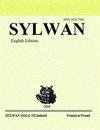在乳腺癌(MCF-7)肿瘤细胞系和人初乳中的调节作用
IF 0.6
4区 农林科学
Q4 FORESTRY
引用次数: 0
摘要
乳腺癌是一种由遗传、免疫和环境相互作用引起的多因素疾病。众所周知,在环境因素中,饮食在癌症病因中起着关键作用。此外,有证据表明,母乳可能会带来长期的好处,比如降低患癌症的风险。在乳腺癌中,巨噬细胞是免疫浸润的主要组成部分之一。这些细胞有助于肿瘤的进展和扩散,但研究表明,这些细胞可以被重新编程,作为一种有效的抗肿瘤免疫反应。除了研究免疫系统细胞与肿瘤进展之间相互作用的机制外,研究还涉及到利用植物作为肿瘤免疫治疗的替代方案,其中塞拉多苔藓植物尤为突出。因此,本研究旨在评价白荆提取物对乳腺癌(MCF-7)肿瘤细胞系和人初乳的调节作用。因此,我们制备了天然提取物,并以此为基础进行免疫分型、细胞因子剂量和数据分析。与MCF-7共培养组中,在存在取消勒珠菌的情况下,炎性细胞因子IL-1和IL-8的分泌增加。此外,在与MCF-7细胞共培养的初乳细胞中,观察到CD14(巨噬细胞)、CD163、CD197+和CD86+ (M1巨噬细胞)以及CD197-和CD86+ (M2巨噬细胞)的表达降低。这些结果表明,初乳巨噬细胞分化为M1和M2两种表型。当与MCF-7乳腺肿瘤细胞共培养时,苔藓植物Lejeunea cancellata降低了两种巨噬细胞表型的百分比。这一数据提示苔藓植物可以抑制肿瘤微环境中M1巨噬细胞引起的炎症浸润的形成和促进肿瘤发生的M2巨噬细胞的进展。本文章由计算机程序翻译,如有差异,请以英文原文为准。
Lejeunea Cancellata as a modulating agent in breast cancer (MCF-7) tumor cell lines and human colostrum
Breast cancer is a multifactorial disease resulting from genetic, immunological, and environmental interactions. Among environmental factors, it is known that diet plays a key role in cancer etiology. In addition, there is evidence that human milk may confer long-term benefits, such as reducing the risk of developing cancer. In breast cancer, macrophages represent one of the main components of the immune infiltrate. These cells contribute to the progression and spread of tumors, but studies suggest that these cells can be reprogrammed to act as a potent antitumor immune response. In addition to the mechanisms involved in the interaction between immune system cells and tumor progression, studies have related the use of plants as an alternative for tumor immunotherapy, among which the Cerrado bryophytes stand out. Thus, this study aimed to evaluate Lejeunea cancellata extract as a modulating agent in breast cancer (MCF-7) tumor cell lines and human colostrum. Therefore, the natural extract of Lejeunea cancellata was prepared, and from this, immunophenotyping assays, cytokine dosage, and data analysis were performed. There was an increase in the secretion of the inflammatory cytokines IL-1 and IL-8 in the groups cocultured with MCF-7 in the presence of Lejeunea cancellata. Furthermore, a decrease in the expression of CD14 (macrophages), CD163, CD197+ and CD86+ (M1 macrophages), and CD197- and CD86+ (M2 macrophages) is observed in colostrum cells when they were treated with Lejeunea cancellata in coculture with MCF-7 cells. These findings indicate that colostrum macrophages differentiate into two phenotypes, M1 and M2. When cocultured with MCF-7 breast tumor cells, the bryophyte Lejeunea cancellata reduces the percentage of both macrophage phenotypes. This data suggests that the bryophyte can inhibit the formation of inflammatory infiltrates caused by M1 macrophages in the tumor microenvironment and the progression of M2 macrophages that promote tumorigenesis.
求助全文
通过发布文献求助,成功后即可免费获取论文全文。
去求助
来源期刊

Sylwan
农林科学-林学
CiteScore
0.70
自引率
16.70%
发文量
0
审稿时长
1 months
期刊介绍:
SYLWAN jest najstarszym w Polsce leśnym czasopismem naukowym, jednym z pierwszych na świecie. Został założony w 1820 roku w Warszawie. Przyczynił się w znakomity sposób do rozwoju polskiego leśnictwa, służąc postępowi, upowszechnieniu wiedzy leśnej oraz rozwojowi nauki.
 求助内容:
求助内容: 应助结果提醒方式:
应助结果提醒方式:


